The Friendly Fire Room Presents
Listen And See
Thank you Wanda Barlow for this great idea!
Pronouns Metaphors Errors Pt 4
Pronouns Metaphors Errors Pt 4
To God be the Glory, great things He has done.
mcmtffr.org wishes to acknowledge and thank Derek Konofalski and Rocket Media for making this page:
Mobile Friendly
Pronouns Metaphors Errors
Part 4
III. Predicative Nominative in Reality:
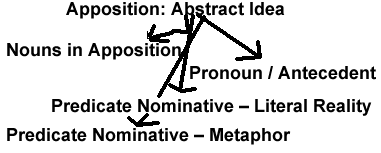
Pairs of Nouns in Apposition:
From the simple to the complex:
(1) pair of nouns in apposition
(2) pronoun and its antecedent

(4) one noun of the predicate nominative sentence“is” another thing by metaphorical representation.
Here a pair of nouns in a predicate nominative sentence are linked by a “to be” verb (or a “become” verb), and state that one thing “is” or “becomes” another thing in reality.
The important thing to understand is that this use is an extension of the appositional idea.
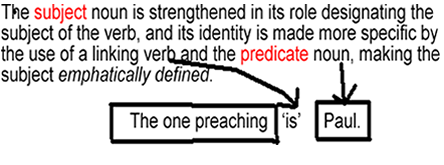
How do we know that Paul is the predicate noun?
And how do we know which noun is the subject noun?
The noun with the definite article (pointer) is the subject, and the noun without the article (pointer) is the predicate
In the predicate noun sentence, the subject noun is the one which is strengthened in significance by making it emphatically defined by the linking verb and the predicate noun.
![]()
The subject noun is strengthened, by being defined more specifically and emphatically by the predicate noun.
So, the standard approach is that the subject noun is the center of attention, and the subject noun becomes more emphatically defined by the addition of a linking verb and a predicate nominative noun.
![]()
The focal idea of ‘the one preaching’ is enhanced by the fact that the one preaching is emphatically identified as Paul.
This statement is the equivalent to saying: The one preaching, look again at the one preaching, is Paul.
![]()
So, while the subject noun remains the center of attention, the mental picture that was originally formed in your mind as you read “The one preaching”, goes into higher definition (HD) by the added information that “Paul” is the one who is doing it.
(Q) What if the author wanted to shift the emphasis to the predicate noun (Paul) while still allowing the focus to remain on “the one preaching”, the subject?
(A) He would reposition the predicate noun to the front.
![]()
The noun with the definite article is still the subject, and the one without the article is still the predicate.
How does the meaning change?
Try to imagine that you are living in the days of the first-century church at Ephesus, and a friend invites you to his church. You ask him, “Who is going to be preaching?” Your focus is centered on simply obtaining the identity of your subject, “the one preaching” that day.
So your friend could tell you, The one preaching, Paul.
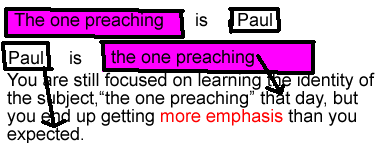
Look at this more carefully.
Subtle The one preaching, Paul.
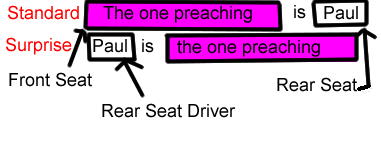
1 Thes. 2.20
You ‘are’ the glory of us.
This statement could have been expressed variously:
The glory of us, you.
The glory of us ‘are’ you.
You “are” the glory of us.
1 Thes. 2.20
You ‘are’ the glory of us.
Subject noun: the glory of us
Predicate noun: you
Linking verb: are
1 Thes. 2.20
You ‘are’ the glory of us.
Standard syntax: The glory of us ‘are’ you.
Surprise syntax: You ‘are’ the glory of us.
Predicate nominative sentences normally describe real relationships between real nouns, that exist in reality.
The glory of us ‘are’ you.
You ‘are’ the glory of us.
Is the idea of glory something that exists in reality? Are the antecedents of the pronoun ‘you’, real persons? Can a real person actually “be” the glory of someone else?
What does the word glory mean? glory; great honor, fame, high reputation. Can a real person really, actually “be” the glory of
someone else?
Wait for it…
Pairs of Nouns in Apposition:
From the simple to the complex:
(1) pair of nouns in apposition
(2) pronoun and its antecedent
(3) one noun of the predicate nominative sentence, linked by a “to be” verb, “is” another thing in reality.
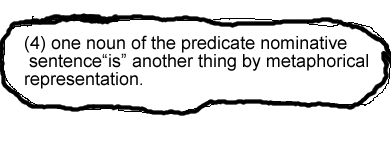
IV. Predicative Nominative - Metaphor:
Romans 6:4
Therefore we were buried with Him through baptism
into death, that just as Christ was raised from the dead
by the glory of the Father, even so we also should walk
in newness of life.
Romans 6:4
Therefore we were buried with Him through baptism into death, that just as Christ was raised from the dead by the glory of the Father, even so we also should walk in newness of life.
(Q) Can “the glory” actually raise a person from the dead?
(A) No, only if “the glory” represents a real person.
Romans 6:4
Therefore we were buried with Him through baptism
into death, that just as Christ was raised from the dead
by the glory of the Father, even so we also should walk
in newness of life.
The One (the Person) who raised Jesus from the dead is God the Holy Spirit. T/F
‘The glory of the Father’ is a figurative designation for the Person of God the Holy Spirit. T/F
‘The glory of the Father’ is a figurative designation for the Person of God the Holy Spirit.
Can a real person actually “be” the glory of someone else, as with God the Holy Spirit and God the Father?
No, but a real person can represent the glory of someone else, as with God the Holy Spirit and God the Father.
1 Thes. 2.20
You ‘are’ the glory of us.
Can real persons actually “be” the glory of someone else, as with ‘you’ and Paul and company? No, but real persons can represent the glory of someone else, as with ‘you’ and Paul and company?
Just as the visible work of the Person of the Holy Spirit contributes to the positive reputation (the glory) of God the Father; so also, the visible work of those ministered to by Paul and company contributes to the positive reputation (the glory) of Paul and company.
Can real persons actually “be” the glory of someone else, as with Paul and company? No.
Can real persons actually “represent” the glory of someone else, as with Paul and company? Yes.
How can we visualize the abstract idea of representation; that is, the metaphor?

How can we visualize the abstract idea of representation; that is, the metaphor?

How can we visualize the abstract idea of representation; that is, the metaphor?

How can we visualize the abstract idea of representation; that is, the metaphor?

Metaphor Defined:
A metaphor is a figure of speech that describes a
subject by asserting that it “is” (represents)
something else on some point of comparison.
The predicate nominative sentence is the “framework” used to introduce the metaphor. The metaphor is a figure of speech comparing
two unlike things without using either "like" or "as“;
therefore, it is not to be mistaken with a simile which
does use "like" or "as" in relationships to make
comparisons. The essence of the whole figure of the metaphor lies in the substantive linking verb “is”, always meaning “represents”, and not in either of the two nouns of the predicate nominative structure.
The Latins call this figure translato (translation), in order to denote the fact that a metaphor is a translation (transfer relation), or a carrying across of one thing and applying it to another which represents it.
represents
![]()
The one thing another thing
One thing {subject} ‘is’ another thing {predicate} in the sense that it {subject} ‘represents’ the other thing {predicate}.
Standard Form
represents
![]()
The one thing another thing
Subject Predicate
This is the same idea we see in action whenever the intended meaning in one language is carried across and expressed (translated, transferred, represented) into the words of another language.
A metaphor is a declaration that one thing “is” another thing, where the word “is” always is the equivalent to the meaning “represents”.
is
represents
![]()
The one thing another thing
A metaphor is a comparison by means of representation; whereas the simile is marked by the word resemblance, the metaphor is marked by the word representation.
A metaphor is confined to a distinct affirmation that one thing is another thing, based upon the sense of some association or connection in the uses or effects of one thing expressed or understood as carried over to another thing.
For example…

This is Steve
.
image (antecedent?)
The full statement: This thing{the image}is Steve.
is
represents
![]()
The one thing another thing
The Image Steve

This is Steve.
This thing {the image} is Steve.
This statement is a metaphor, because some effect is suggested when seeing the paper image and is carried over (transferred, translated) to our perception of Steve. The image is a metaphor that represents the person of Steve; when we see the image, we can think of Steve in some particular way which the image suggests.
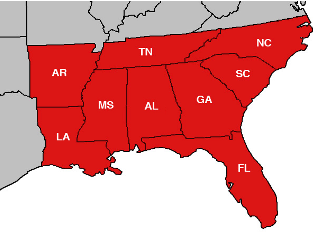
This is Florida.

map (antecedent?)

This is Florida.
This statement is a metaphor, because the effect of actually seeing the physical shape and position of the map relative to other southeastern states is carried over (transferred, translated) to the our perception of Florida.
This is Florida.
This thing {the map} is Florida. The map is a metaphor that represents the State of Florida; when we see the map, we can think of Florida in some particular way which the map suggests.
In a metaphor, the two nouns
(Steve and the image / Florida and the map)
are each always to be taken in their absolutely
literal sense;
Steve, the image / Florida, and the map are each literal realities,
otherwise no one could tell what they mean.
Unless we are specifically told how the image of Steve could miraculously “become” the actual person of Steve in literal reality, common sense tells us to take the statement “This is Steve” as a metaphor, the image as a representation, and not as a statement of literal reality.
Unless we are specifically told how the map of Florida could miraculously “become” the actual state of Florida in literal reality, common sense tells us to take the statement “This is Florida” as a metaphor, the map as a representation, and not as a statement of literal reality.
Many will be surprised on the Day of Judgment when they discover that it was just as the Word of God says; only the righteousness of Christ is able to save you.
All men are sinners and no one can save himself. God is just, so He must punish sin; but He is also merciful, moreover gracious, and offers His Son as the perfect sacrifice in order to purchase a place for you in heaven, which He offers to you as the free gift of eternal life.
Jesus is the Christ, the Messiah, the Anointed One, He is God Incarnate.
In order to pay the debt of our sins,
He came from Heaven, having been sent by the Father,
where He lived a life of perfect obedience to the Father
even unto the shameful death upon the cross
in order to pay the debt of your sins.This gift must be received by faith,
believing that Jesus’ perfect life and Cross Work
was His complete and necessary Atonement
for your sins, in your behalf.
Faith is a gift that comes by the Power of God the Holy Spirit working in a person’s innermost being.
Only the power of God can open your heart to the willingness to have the void within it filled
with the presence of Christ by His Spirit.The Holy Spirit has the authority and power to quicken your dead spirit, to make it come to life.
Only the life of His Spirit’s quickening of your heart will allow the Gospel message of salvation to even make sense to you, to truly “hear” the message and give you the ability,
as the Holy Spirit bears witness to Jesus,
to recognize your need for forgiveness and restoration, and gain the desire of your heart to be favorably inclined to want to receive Christ as your personal Lord and Savior. If you have not done so before this moment,
ask Jesus to forgive you your sins,
tell Him you’ve stop trying to be your own savior,
and ask Him to come into your life right now,
and to give you eternal life.
Then, in faith believing,
thank Him for the gift that He is giving you,
the one He paid for in full in your place,
in Jesus’ name,
AMEN
Copyright October, 2014
Rev. Jim Craig
All Rights Reserved
Bibliography
Agnes, Michael and Charlton Laird (eds.). Webster’s New World Dictionary and Thesaurus. New York, NY: Macmillan, 1996.
Aland, Kurt, Matthew Black, Carlo M. Martini, Bruce M. Metzger, and Allen Wikgren (eds.). The Greek New Testament, 4th rev. ed. Germany: Biblica-Druck, 1994.
Benner, Jeff A. The Ancient Hebrew Lexicon of the Bible. College Station, Texas: Virtualbookworm.com Publishing Inc., 2005
Bullinger, E. W. Figures of Speech Used in the Bible; Explained an Illustrated. Grand Rapids, Michigan: Baker Book House, 2007.
Chapman, Benjamin. Greek New Testament Insert. Grand Rapids, Michigan: Baker Book House, 1977.
Dana, H. E., and Julius R. Mantey. A Manual of the New Testament. Canada: The Macmillan Company, 1957.
Louw, Johannes P. and Eugene A. Nida. Greek-English Lexicon of the New Testament Based on Semantic Domains. New York, NY: United Bible Societies, 1989.
The ESV Study Bible. Wheaton, Illinois: Crossway, 2011.
Metzger, Bruce M. Lexical Aids for Students of New Testament Greek. Princeton, New Jersey, 1977.
Wikipedia contributors. "Xenophon." Wikipedia, The Free Encyclopedia. Wikipedia, The Free Encyclopedia, 15 Aug. 2014. Web. 19 Aug. 2014.
Wuest, Kenneth S. The New Testament; An Expanded Translation. Grand Rapids, Michigan, 1992.
Wuest, Kenneth S. (Revised, Donald L. Wise). The Practical Use of the Greek New Testament, rev. ed. Chicago, Il: Moody Press, 1982.
Walsh, J. Martyn and Anna Kathleen Walsh. Plain English Handbook: A Complete Guide to Good English, 7th rev. ed. Cincinnati, Ohio: McCormick-Mathers PublishingCompany,1977.